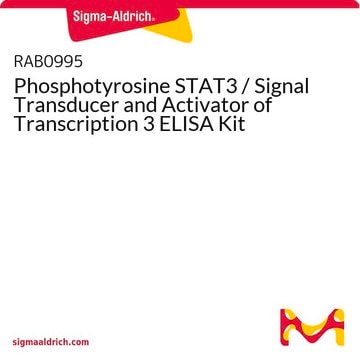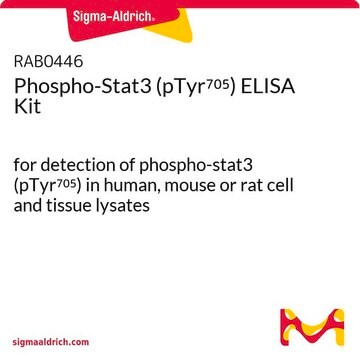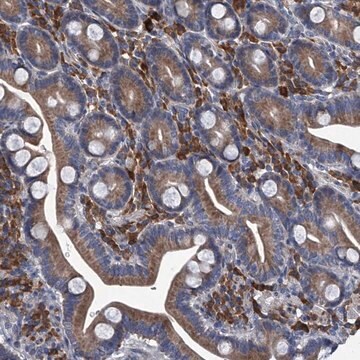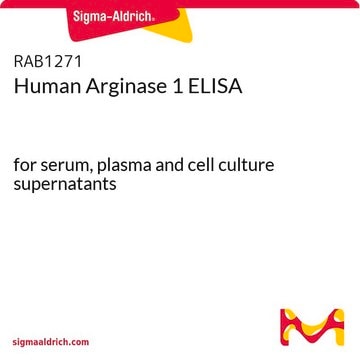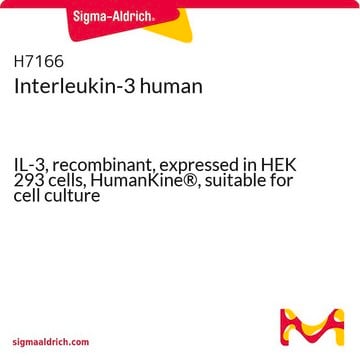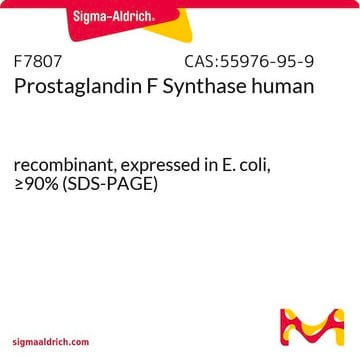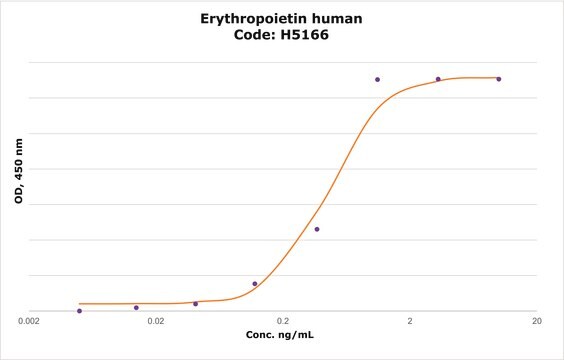RAB0444
Cell-Based ELISA for detecting phospho-STAT3 (pTyr705) in cultured cell lines
96 assays
Sign Into View Organizational & Contract Pricing
All Photos(1)
About This Item
UNSPSC Code:
41116158
NACRES:
NA.32
Recommended Products
usage
96 assays
species reactivity
rat, human, mouse
technique(s)
ELISA: suitable
capture ELISA: suitable
shipped in
wet ice
storage temp.
−20°C
Gene Information
human ... STAT3(6774)
mouse ... STAT3(20848)
rat ... STAT3(25125)
General description
The Cell-Based Stat3 (pTyr705) ELISA kit is a very rapid, convenient and sensitive assay kit that can monitor the activation or function of important biological pathways in cells. It can be used for measuring the relative amount of Stat3 (pTyr705) phosphorylation and screening the effects of various treatments, inhibitors (such as siRNA or chemicals), or activators in cultured human, mouse and rat cell lines.
The STAT3 (signal transducer and activator of transcription)gene is mapped to human chromosome 17q21.2. Upon phosphorylation, STAT3 translocates to nucleus from cytoplasm, where it mediates a number of biological processes. The protein structure includes the following domains : N-domain, coiled-coil domain, DNA-binding domain, linker domain, SH2 domain and transcriptional activation domain.
The STAT3 (signal transducer and activator of transcription)gene is mapped to human chromosome 17q21.2. Upon phosphorylation, STAT3 translocates to nucleus from cytoplasm, where it mediates a number of biological processes. The protein structure includes the following domains : N-domain, coiled-coil domain, DNA-binding domain, linker domain, SH2 domain and transcriptional activation domain.
Immunogen
Stat3 (pTyr705) synthetic phosphopeptide
Application
For research use only. Not for use in diagnostic procedures.
Please refer to the attached General ELISA KIT Procedure (sandwich, competitive & Indirect ELISA)
Please refer to the attached General ELISA KIT Procedure (sandwich, competitive & Indirect ELISA)
Biochem/physiol Actions
Signal transducer and activator of transcription (STAT) proteins are a family of latent cytoplasmic transcription factors involved in cytokine, hormone, and growth factor signal transduction. STAT proteins mediate broadly diverse biological processes, including cell growth, differentiation, apoptosis, fetal development, transformation, inflammation, and immune response. Unlike all other members of the STAT gene family, ablation of STAT3 leads to embryonic lethality and it has been suggested that this protein might represent a primordial STAT protein. It evokes a number of distinct responses in different cells, including induction of an acute-phase response in hepatoma cells, stimulation of proliferation in B lymphocytes, activation of terminal differentiation and growth arrest in monocytes, and maintenance of the pluripotency of embryonic stem cells. Dysregulation of STAT3 signaling has been demonstrated to contribute to malignant cellular transformation. Src kinase-mediated activation of STAT3 has been shown to be essential in prostate and ovarian carcinomas. In head and neck cancers, constitutive STAT3 activity with up-regulated epidermal growth factor receptor (EGFR) signaling plays an important role in malignant proliferation. STAT3 may be a key player in the pathogenesis of diverse human cancers which makes this molecule a prime target for novel therapies.
Kit Components Also Available Separately
Product No.
Description
SDS
- RABBLOCK5x Blocking Solution (Item F)SDS
- RABFIX1Fixing Solution (Item D)SDS
- RABHRP1HRP-conjugated Anti-Rabbit IgG Concentrate (Item I1)SDS
- RABHRP2HRP-conjugated Anti-Mouse IgG Concentrate (Item I2)SDS
- RABPLATE1Uncoated MicroplateSDS
- RABQUENCHQuenching Solution for Cell-based ELISA Assay (Item E)SDS
- RABSTOP1Stop SolutionSDS
See All (10)
Storage Class Code
10 - Combustible liquids
Certificates of Analysis (COA)
Search for Certificates of Analysis (COA) by entering the products Lot/Batch Number. Lot and Batch Numbers can be found on a product’s label following the words ‘Lot’ or ‘Batch’.
Already Own This Product?
Find documentation for the products that you have recently purchased in the Document Library.
The role of IL-6 and STAT3 in inflammation and cancer.
Hodge D R, et al.
European Journal of Cancer, 41(16), 2502-2512 (2005)
STATs and gene regulation.
Darnell J E
Science, 277(5332), 1630-1635 (1997)
STAT3 single-nucleotide polymorphisms and STAT3 mutations associated with hyper-IgE syndrome are not responsible for increased serum IgE serum levels in asthma families.
Wjst M, et al.
European Journal of Human Genetics, 17(3), 352-352 (2009)
What does Stat3 do?.
Levy D E and Lee C K
The Journal of Clinical Investigation, 109(9), 1143-1148 (2002)
Crystal structure of unphosphorylated STAT3 core fragment.
Ren Z, et al.
Biochemical and Biophysical Research Communications, 374(1), 1-5 (2008)
Our team of scientists has experience in all areas of research including Life Science, Material Science, Chemical Synthesis, Chromatography, Analytical and many others.
Contact Technical Service